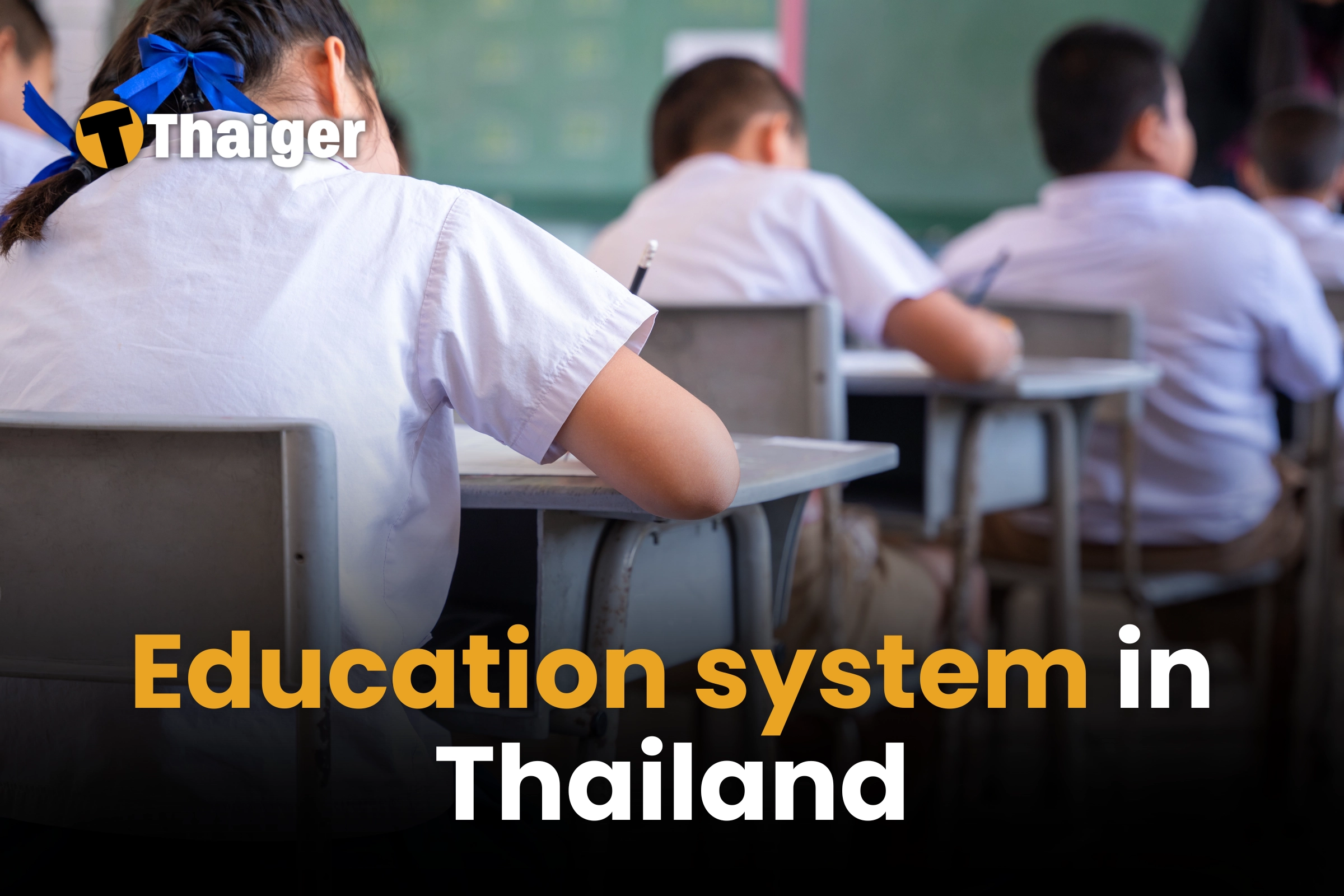Education system in Thailand: what you need to know

Thailand hosts over 30,000 schools, nurturing more than 20 million students through a well-organised framework. Education here spans 12 years and is compulsory for nine of those, divided into two main phases: primary and secondary education. The primary level runs for six years (Prathom 1-6), and the secondary splits into lower (Mattayom 1-3) and upper (Mattayom 4-6) levels, each lasting three years. Since 2003, finishing Mattayom 6 has become a national mandate, reflecting the government’s push for advanced educational attainment.
Now let’s get into the Thai education system.
The Thai education system
If you’re diving into the Thai education system as an expat, get ready to explore a landscape shaped by deep history and unique cultural influences. Knowing the ins and outs of this system will help you make informed choices for your family’s education.
Vocational education plays a critical role, equipping learners with skills tailored for specific careers. Meanwhile, higher education offers an avenue for academic and professional growth, supported by the Thailand Qualification Framework (TQF). This ensures standardised qualifications across the board, drawing inspiration globally to maintain educational excellence.
Languages of instruction
The primary language of instruction in Thailand is Thai. English is taught as a second language from primary school onwards. Some international schools offer bilingual or English-only instruction, catering to expatriates and those seeking global education.
The education system in Thailand blends cultural heritage with modern teaching methods, providing a comprehensive approach to learning.
Education levels

Understanding education levels in Thailand can help you navigate the system more effectively. From pre-primary to tertiary, each level builds on the last, aiming to equip students with the knowledge and skills for success. As you plot your child’s educational journey, keeping these levels in mind will serve you well.
Education levels in Thailand
| Level | Age Range | Curriculum Focus | Assessment Methods |
|---|---|---|---|
| Pre-School (Anuban 1-3) | 3-5 | Early childhood development, numeracy, literacy, social skills | Observation, play-based activities |
| Primary (Prathom 1-6) | 6-12 | Thai language, mathematics, science, social studies, English | Quizzes, mid-term tests, final exams |
| Secondary (Lower / Matthayom 1-3) | 13-15 | Advanced Thai language, mathematics, science | Quizzes, mid-term tests, final exams |
| Secondary (Upper / Matthayom 4-6) | 16-18 | Specialised subjects, preparation for higher education or vocational training | Quizzes, mid-term tests, final exams |
| Tertiary (University) | Varies | Undergraduate, graduate, and doctoral programs in various fields | Assignments, research papers, exams, dissertations |
Vocational education
| Type | Key Features | Benefits |
|---|---|---|
| Dual Vocational Training (DVT) | Combination of in-class learning and hands-on experience | Practical skills, industry relationships, job-ready graduates |
| Post-Secondary Vocational Education | Advanced skills training in specific fields | Specialised expertise, better job prospects, higher salaries |
Primary School (Prathom Suksa)
Understanding education in Thailand, especially for expats, means grappling with its structured phases. Primary education stretches over six years, from Prathom 1 to Prathom 6, keeping your child engaged until they turn 12. It’s then that the leap to secondary education occurs.
Dividing the primary stage, the Thai education system overview reveals two segments: lower and upper elementary. Lower elementary covers the first three years, Prathom 1 to 3, introducing students to fundamental concepts. The following years, Prathom 4 to 6, encompass the upper elementary, where the curriculum advances in complexity, paving the way for secondary education.
Thai primary schools adhere to a comprehensive curriculum designed to foster well-rounded students. The core subjects taught include:
- Art
- Foreign languages
- Health and physical education
- Mathematics
- Occupation and technology
- Science
- Social studies, religion, and culture
- Thai language
Public Primary Schools
Public primary schools, funded and regulated by the government, play a vital role in Thailand’s education system. They offer a curriculum designed by the Ministry of Education, which includes subjects like Thai language, mathematics, science, social studies, and health education. All schools follow a standardised set of guidelines to ensure quality education across the country.
- Accessibility: Public schools are widespread, making them accessible to most children.
- Teachers: Public school teachers are required to possess qualified teaching credentials and engage in continuous professional development.
- Facilities: Basic facilities include classrooms, libraries, computer labs, and sports facilities.
Private Primary Schools
Private primary schools provide an alternative to public education, often offering a different curriculum or specialised programmes. They receive funding through tuition fees and, in some cases, supplementary government support.
- Curriculum: Private schools may incorporate international programmes, such as the International Baccalaureate (IB), alongside the national curriculum.
- Class Size: Typically, they offer smaller class sizes, fostering more personalised attention.
- Extracurricular Activities: Emphasis is placed on extracurricular activities such as arts, sports, and languages.
Secondary School (Mathayom Suksa)
Secondary education is split into two tiers: lower and upper. The lower tier caters to students up to the age of 15 and is compulsory. It continues the educational foundation laid during primary school, focusing on a broad curriculum designed to equip students with a well-rounded knowledge base.
- It’s divided into lower (Mathayom 1-3) and upper (Mathayom 4-6) segments.
- Attendance is mandatory up until the end of lower secondary.
Thai secondary schools offer a comprehensive curriculum designed to prepare students for higher education and the workforce. The core subjects include:
- Arts, careers, and technology
- Foreign languages (i.e., English or French)
- Health and physical education
- Mathematics
- Religion and culture
- Science (Chemistry, Physics, and Biology for some programme)
- Social studies
- Thai language
Public Secondary Schools
Public secondary schools offer education free of charge. The curriculum follows guidelines set by the Ministry of Education, with core subjects including Thai language, mathematics, science, and social studies. Schools also provide extracurricular activities like sports and arts to promote holistic development.
- Accessibility: Public schools are widespread, making them accessible to most children.
- Teachers: Public school teachers are required to possess qualified teaching credentials and engage in continuous professional development.
- Facilities: Basic facilities include classrooms, libraries, labs, and sports facilities.
Private Secondary Schools
Private secondary schools adhere to the national curriculum but often incorporate additional programs. Many private institutions offer specialised tracks.
- Curriculum: Private schools may incorporate international programmes, such as the International Baccalaureate (IB), alongside the national curriculum.
- Class Size: Typically, they offer smaller class sizes, fostering more personalised attention.
- Extracurricular Activities: Emphasis is placed on science or language-focused courses, to cater to students’ interests and career aspirations.
For expats, it’s vital to grasp that the Thai academic year begins in May and ends in March. School hours typically run from 8.30 am to 3.30 pm. This might differ from what you’re used to, so planning your schedule accordingly is wise.
Government bodies involved in Education in Thailand

The Ministry of Education oversees Thailand’s education system, setting policies and standards. They ensure that both public and private institutions meet the criteria to deliver quality education. Being familiar with their regulations can offer peace of mind about your child’s schooling.
National educational tests (Admission system)
National educational tests in Thailand assess students’ proficiency across different educational stages. These exams ensure students meet academic standards and are prepared for higher education or vocational paths.
TGAT – Thai General Aptitude Test
The TGAT, or Thai General Aptitude Test, measures students’ general reasoning, problem-solving, and comprehension skills. Conducted by the National Institute of Educational Testing Service (NIETS), this test evaluates abilities essential for university admission. The TGAT covers three main areas:
- Verbal reasoning: Language comprehension and logical analysis
- Numerical reasoning: Mathematical skills and data interpretation
- Analytical reasoning: Critical thinking and problem-solving
TPAT – Thai Professional Aptitude Tests
The TPAT, or Thai Professional Aptitude Tests, cater to students pursuing specialised fields. These tests assess subject-specific knowledge and professional skills relevant to various disciplines. Administered by NIETS, TPAT exams vary depending on the academic or vocational course:
- Engineering: Technical and practical engineering concepts
- Medicine: Biological sciences and clinical aptitude
- Teaching: Pedagogical skills and educational knowledge
- Science and Mathematics: Advanced theories and problem-solving in STEM fields
- Humanities and Social Sciences: In-depth analysis of historical, cultural, and social concepts
Business and Economics: Applied knowledge in finance, management, and economic principles
A-Level (Advanced Level)
The Thai A-Level is part of the TCAS (Thai University Central Admission System), which streamlines university admissions for final-year high school students. It is designed to assess students’ readiness for higher education.
Unlike the UK A-Level, which is a two-year program culminating in a series of examinations, the Thai A-Level focuses on specific subjects that are relevant for university entry.
Core subjects for Thai A-Level:
Mathematics
- A-Level Math 1: Basic Mathematics and Additional Mathematics.
- A-Level Math 2: Applied Mathematics.
Science Subjects
- A-Level Physics: Focuses on fundamental principles and applications of physics.
- A-Level Chemistry: Covers chemical principles, reactions, and laboratory practices.
- A-Level Biology: Studies living organisms, their functions, and ecosystems.
Social Studies
A-Level Social Studies: Explores social sciences, including history, geography, and sociology.
Language Subjects
- A-Level Thai Language: Emphasizes reading, writing, and comprehension skills in Thai.
- A-Level English Language: Focuses on English language proficiency, including grammar and composition.
Foreign Languages: Students can choose one foreign language from options such as:
- French
- German
- Japanese
- Korean
- Chinese
- Spanish
- Pali
Comparison of TGAT, TPAT, and A-Level
| Qualification | Purpose | Content Focus | Usage |
|---|---|---|---|
| TGAT | General aptitude assessment | Logical reasoning, problem-solving | General university admissions |
| TPAT | Professional aptitude assessment | STEM subjects (Math, Physics, Chemistry) | Engineering and technical program admissions |
| A-Level | Subject-based qualification | Various subjects (e.g., Math, Sciences) | University admissions both domestically and internationally |
Additional considerations

When evaluating the education system of Thailand, several additional factors need attention to gain a comprehensive understanding.
Cost of education
In Thailand, public education is free for nine years, spanning primary and lower secondary levels. For upper secondary education, costs can range from 3,000 to 30,000 baht annually for government schools, depending on location and facilities. Private institutions often charge higher, with fees starting at 100,000 baht. Higher education costs vary significantly, with undergraduate programmes at public universities averaging 20,000 to 30,000 baht per year. For international schools and universities, fees can exceed 500,000 baht.
| Education Level | Estimated Cost (Annual) |
|---|---|
| Primary and Lower Secondary | Free |
| Upper Secondary (Government) | 3,000 to 30,000 baht |
| Upper Secondary (Private) | 100,000 baht above |
| Undergraduate (Public) | 15,000 to 30,000 baht |
| International Schools/Universities | 500,000 baht and above |
School calendar and hours
The Thai school calendar starts in mid-May and concludes in late March. The academic year is divided into two semesters. The first lasts from May to October and the second from November to March. Students typically attend school from Monday to Friday, beginning at 8:00 AM and ending at 3:30 PM. Extra hours may apply for tutoring or extracurricular activities.
Parental involvement
Parental involvement is crucial in Thailand’s education system. Parents participate in school activities and parent-teacher meetings. Schools often encourage parental feedback to improve educational outcomes. Volunteering in school events and contributing to decision-making processes fosters a collaborative environment.
Scholarships and Financial Aid
Scholarships and financial aid can reduce your educational expenses significantly.
- Government Scholarships: The Thai government offers scholarships for exceptional students, including Royal Thai Scholarships and The King’s Scholarships. These cover tuition, living expenses, and educational materials.
- University Scholarships: Many Thai universities provide scholarships for both local and international students, covering full or partial tuition. Check specific university websites for detailed scholarship programs.
- Private Scholarships: Organisations like the Thai International Education Consultants Association (TIECA) offer scholarships specific to certain fields of study. These might cover part of the tuition or provide living stipends.
- Need-Based Aid: Some institutions offer financial aid based on your family’s economic situation. It requires thorough documentation but can substantially reduce costs.
By understanding the costs and exploring financial aid options, you can better navigate the Thailand Education System and make informed decisions.
Benefits of studying in Thailand for international students
Thailand offers international students a unique and affordable educational experience. With lower living costs and world-class universities, it’s a great place to study. You’ll immerse yourself in a vibrant culture, gain hands-on experience through internships and fieldwork, and have the opportunity to explore Southeast Asia. The friendly Thai people and thriving job market make Thailand an excellent choice for international students seeking a rewarding academic journey.
Cons of studying in Thailand for international students
Studying in Thailand offers a unique cultural experience and affordable education, but it’s important to be aware of both pros and cons that international students may face. While the language barrier, cultural adjustments, and academic recognition issues can be significant, careful planning and preparation can help mitigate these difficulties.
Useful resources about education in Thailand
- Ministry of Education
- Office of the Permanent Secretary
- Office of the Basic Education Commission
- Office of the Vocational Education Commission
- Office of the Education Council
- Office of the Private Education Commission
- The Commission on Higher Education
- Office of the Non-formal and Informal Education
- How to find the perfect language school in Thailand
Latest Thailand News
Follow The Thaiger on Google News:



























